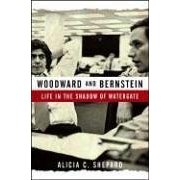 New Book ExploresWatergate Tag Team
New Book ExploresWatergate Tag TeamTwo weeks ago, a couple of mastodons appeared together on CBS's
60 Minutes, doing what they do best.
Mike Wallace was interviewing Bob Woodward, kicking off the usual publicity blitz over the latter's latest book about Beltway intrigue. Only this time, some of the thunder was stolen by the
New York Time's front-page, embargo-breaking revelations about the book two days earlier.
Woodward and Wallace are quite a pair. The latter pretends to be a trenchcoated tough guy reporter, when in truth he mostly reads others' scripts and relies on producers, assistants who do the real reporting while he tends to his pancake makeup (Woodward deliciously pulled back the curtain on all this fakery during the interview, by noting that he had earlier played his tapes "for your producers," in other words, for the people who did the real work of preparing for the interview).
As for Woodward--well, at least he had a glorious past. His reputation has lately taken some major hits, and deservedly so, for the way he has credulously come to be a transmission belt for official Washington. After two earlier, largely admiring books about the George W. Bush White House, he has finally figured out the truth in this capper of his George W. trilogy. Stop the presses, he screams: this White House has been putting a pretty face on a war in Iraq that's actually going poorly. He presents this with his signature poker face, apparently unaware that most of the rest of the world figured this out quite some time ago.
Just when you thought you've had enough of Bob Woodward's smarmy insiderism and stenographic "insights" into Washington officialdom, a timely new book comes along to remind you that he wasn't always this gullible. He and sidekick Carl Bernstein first came to prominence decades ago during Watergate for pursuing their subjects in quite the opposite fashion: by ignoring the access game and the seductive lies that powerful people tell, and instead slowly piecing together the real story. But the book,
Woodward and Bernstein--Life in the Shadow of Watergate, by journalism professor Alicia Shepard, is ultimately disappointing. That’s in part because so much of this ground has already been plowed--both more deeply and in a far more stylish way--many years ago by David Halberstam, in his magisterial
The Powers that Be.
Still, it’s interesting to see how the partnership has played out ever since. The core of the story remains the wonderfully, even comically, mismatched pair of reporters. Bernstein, the product of New York Jewish radicals (whose own bar mitzvah, he would later learn, had been infiltrated by the FBI), a dashing writer with a short attention span and a zest for the A-list New York night life that routinely lands him in the gossip columns (his response over the years has been to give dozens of speeches, at $15K a pop, about how trashy the media has become). And Woodward, the bland Midwestern Naval veteran, a clumsy writer but a reporter of ferocious stamina, whose home office is rightly called "The Factory." As the notes of the director of
All the President's Men put it: “Bernstein fit the naughty boy syndrome, and Woodward fit the good boy syndrome—but they needed each other.”
Shepard adds much new material, some of the most interesting of it culled from her patient search of the pair’s massive Watergate files, notes and other material they sold three years ago to the University of Texas library for a cool $5 million. Shepard uses the material to good effect, reproducing generally unanswered mash notes from female fans and telling details of their one-time business arrangements (in 1977, they closed the joint bank account they had used until then for movie and book rights, signaling a long cooling-off period in their friendship). She also adds a fresh look at Woodward, whose "Cheneyesque sense of absolute authority and calm," in the words of his
Post colleague Bob Kaiser, has been put in the service of one bestselling book after the other. His curious arrangement with the
Post, meanwhile, which lets him mostly keep his bombshells for his books, has earned him the envious newsroom nickname Mr. Carte Blanche.
She quotes David Gergen's take on Woodward: 'There's both a psychological quality and an empathic quality to him,' said David Gergen, who has known Woodward since Watergate and has fallen under his spell while working for the Nixon and Clinton administrations. 'He provides peopole withthe sense of safety, that somehow, if you tell him, it will be reported straight, straighter than anyone else. He is able to bond with people in a way that most journalists can't. There's a pschological bonding tha tgoes on. He's very good at putting himself in the minds or shoes of others. But you've got to know before you sit down with Bob Woodward how far you are willing to go with the information. He's very seductive.'
While the recent unmasking of Deep Throat ends a 33-year-old mystery, Shepard points out its lasting importance for journalism. “Deep Throat was not just a quixotic mystery. His debut in 1974 changed journalism, because he lent credibility to the notion of using anonymous sources. Through their rigorous reporting, which relied so heavily on confidential sources, Woodward and Bernstein succeeded in popularizing the use of anonymous sources.” Of course, that has also occasionally had disastrous results, including for Woodward himself. His goal of succeeding his mentor Ben Bradlee as editor of the
Post ended with the Janet Cooke affair, in which the
Post had to return a Pulitzer for a fictional story of an eight-year-old heroine addict.
The book nicely documents the slow dance over the movie that sealed the pair's gigantic fame. Woodstein agreed to do it only because they trusted Robert Redford, who at the time was fresh off his movie
The Candidate, which took a hard outsider look at the cynical world of electoral politics. At first, he imagined what later came to be
All The President’s Men as a no-star, black-and-white documentary on investigative reporting.
"Redford promised to make a serious movie about reporting—not a Hollywood, flashy move about the shifty Watergate figures surrounding Nixon or a screwball comedy about newspapering," Shepard writes. "Woodward and Bernstein wanted a movie that would honesty portray reporters. Redford had no intention of glamorizing either them or investigative reporting. He wanted to educate the public about the rigors of investigative journalism; to show how meticulous reporters need to be, how many dead ends they pursue, and how repetitive, sometimes downright boring, investigative reporting could be. Yet there also needed to be an element of comic byplay."
In the end, of course, the movie did indeed glamorize both the reporting pair and their craft. It touched off an immediate wave of interest in journalism school that in certain ways could be said to continue to this day. But the movie also had an ironic twist for the two men. Shepard writes that after the movie, “the names Woodward and Berstein were famous, but their faces had morphed into those of Redford and Hoffman. In a small way, they had gotten back some of their anonymity.”
Woodward and Bernstein will remain famous names for as long as people recall newspaper journalism and American politics. That's what happens when you help topple an American president near the apex of the American Century.
 Cover Boy Lebron
Cover Boy Lebron






